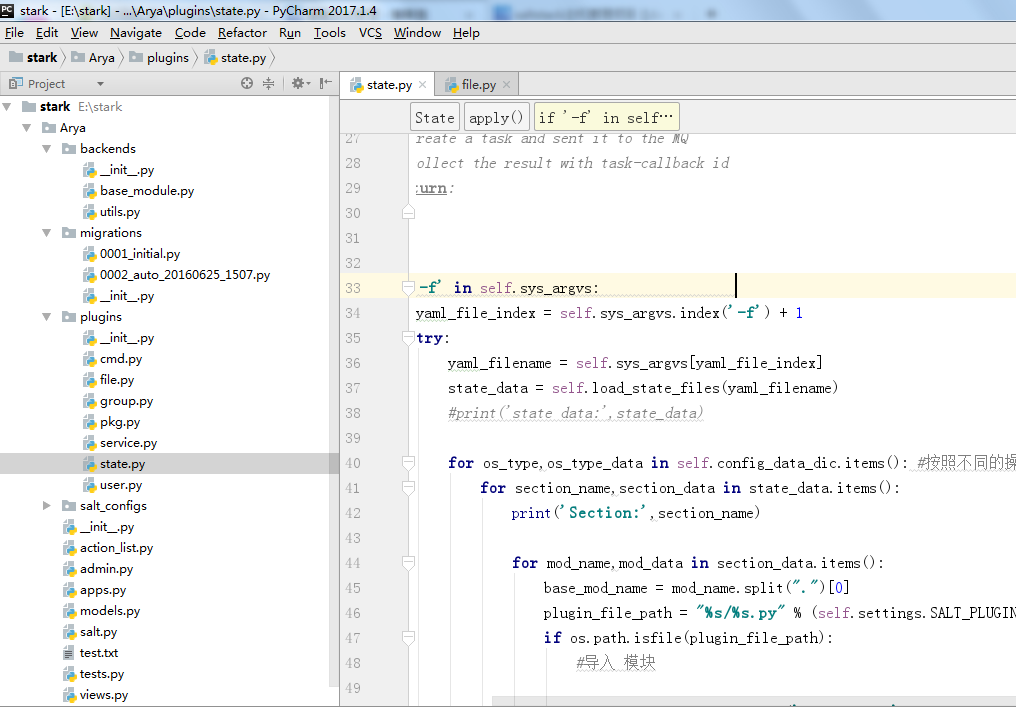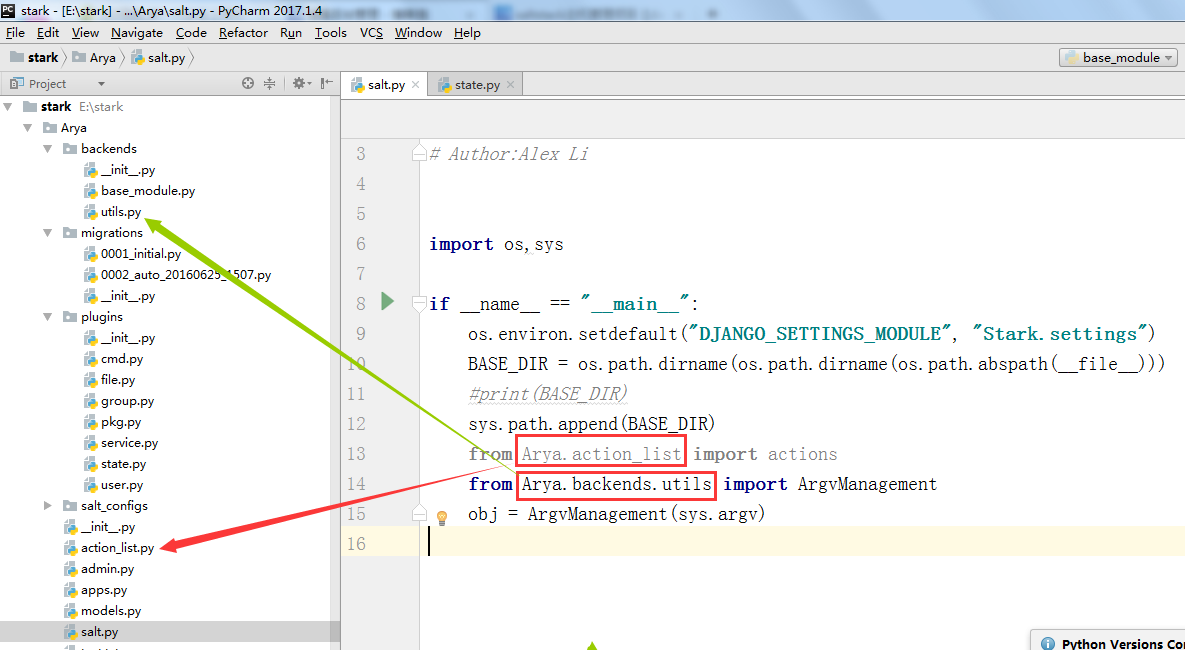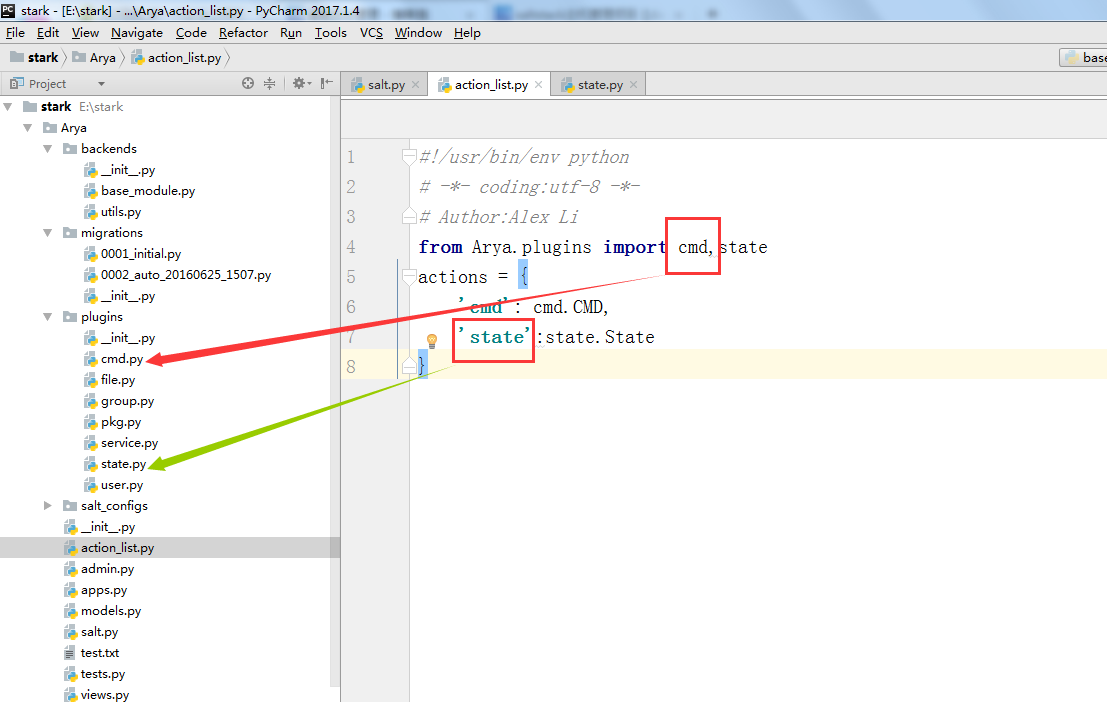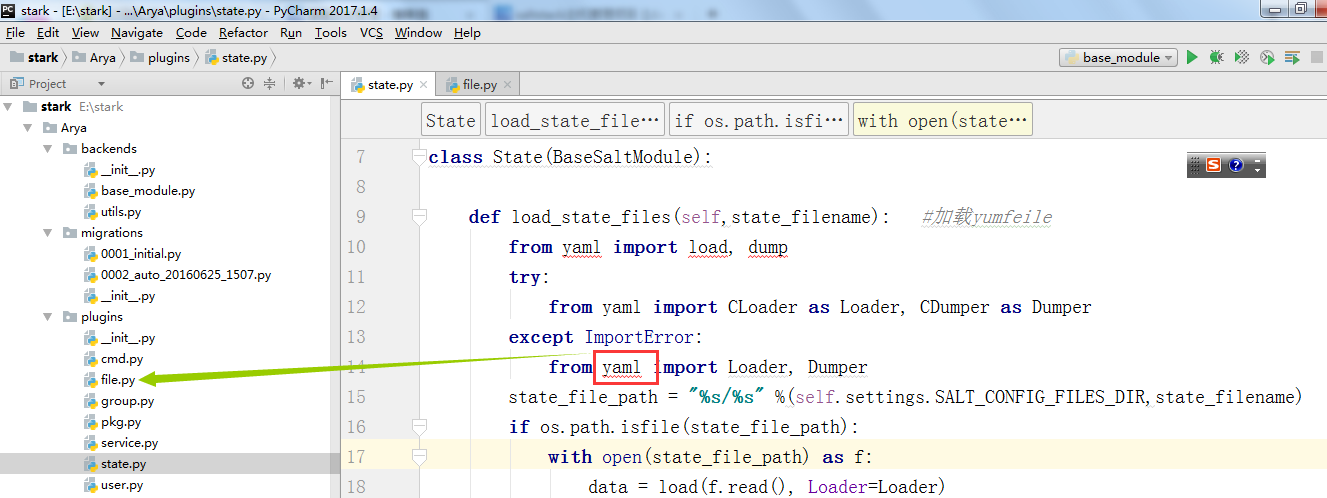项目目标
salt state.apply -h "ubuntu,centos" -g "ubuntu,centos" -f "ubuntu,centos"
文件目录规划

配置文件详解
步骤一:创建一个salt
salt配置文件
#!/usr/bin/env python
# -*- coding:utf-8 -*-
# Author:Alex Li
import os,sys
if __name__ == "__main__":
os.environ.setdefault("DJANGO_SETTINGS_MODULE", "Stark.settings")
BASE_DIR = os.path.dirname(os.path.dirname(os.path.abspath(__file__)))
#print(BASE_DIR)
sys.path.append(BASE_DIR)
from Arya.action_list import actions
from Arya.backends.utils import ArgvManagement
obj = ArgvManagement(sys.argv)

步骤二:utils命令分发器分发器通过action_list.py把不同的命令分给不同的模块
#!/usr/bin/env python
# -*- coding:utf-8 -*-
# Author:Alex Li
import sys
from Arya import action_list
import django
django.setup()
from Stark import settings
from Arya import models
class ArgvManagement(object):
'''
接收用户指令并分配到相应模块
'''
def __init__(self,argvs):
self.argvs = argvs
self.argv_parse()
def help_msg(self):
print("Available modules:")
for registered_module in action_list.actions:
print(" %s" % registered_module)
exit()
def argv_parse(self):
#print(self.argvs)
if len(self.argvs) <2:
self.help_msg()
module_name = self.argvs[1]
if '.' in module_name:
mod_name,mod_method = module_name.split('.')
module_instance = action_list.actions.get(mod_name)
if module_instance:#matched
module_obj = module_instance(self.argvs,models,settings)
module_obj.process() #提取 主机
if hasattr(module_obj,mod_method):
module_method_obj = getattr(module_obj,mod_method)#解析任务,发送到队列,取任务结果
module_method_obj() #调用指定的指令
else:
exit("module [%s] doesn't have [%s] method" % (mod_name,mod_method))
else:
exit("invalid module name argument")

actions_list文件内容
#!/usr/bin/env python
# -*- coding:utf-8 -*-
# Author:Alex Li
from Arya.plugins import cmd,state
actions = {
'cmd': cmd.CMD,
'state':state.State
}
步骤三:state模块
模块功能说明
- state模块加载yaml file 文件
- 根据字符串把所有的模块加载出来
- 不同的操作系统语法不同,所以就有通用模块和特殊模块
- 解析还未做做
- 每个参数当做一个函数处理(等待商确)
- 通用类的好处 写一个通用的类 类的继承
- 体会到用继承类的好处

具体配置文件
state
#!/usr/bin/env python
# -*- coding:utf-8 -*-
# Author:Alex Li
from Arya.backends.base_module import BaseSaltModule
import os
class State(BaseSaltModule):
def load_state_files(self,state_filename): #加载yumfeile
from yaml import load, dump
try:
from yaml import CLoader as Loader, CDumper as Dumper
except ImportError:
from yaml import Loader, Dumper
state_file_path = "%s/%s" %(self.settings.SALT_CONFIG_FILES_DIR,state_filename)
if os.path.isfile(state_file_path):
with open(state_file_path) as f:
data = load(f.read(), Loader=Loader)
return data
else:
exit("%s is not a valid yaml config file" % state_filename)
def apply(self):
'''
1. load the configurations file
2. parse it
3. create a task and sent it to the MQ
4. collect the result with task-callback id
:return:
'''
if '-f' in self.sys_argvs:
yaml_file_index = self.sys_argvs.index('-f') + 1
try:
yaml_filename = self.sys_argvs[yaml_file_index]
state_data = self.load_state_files(yaml_filename)
#print('state data:',state_data)
for os_type,os_type_data in self.config_data_dic.items(): #按照不同的操作系统单独生成一份配置文件
for section_name,section_data in state_data.items():
print('Section:',section_name)
for mod_name,mod_data in section_data.items():
base_mod_name = mod_name.split(".")[0]
plugin_file_path = "%s/%s.py" % (self.settings.SALT_PLUGINS_DIR,base_mod_name)
if os.path.isfile(plugin_file_path):
#导入 模块
module_plugin = __import__('plugins.%s' %base_mod_name)
special_os_module_name = "%s%s" %(os_type.capitalize(),base_mod_name.capitalize())
#print('dir module plugin:',module_plugin,base_mod_name)
#getattr(module_plugin,base_mod_name)
module_file= getattr(module_plugin, base_mod_name) # 这里才是真正导入模块
if hasattr(module_file, special_os_module_name): #判断有没有根据操作系统的类型进行特殊解析 的类,在这个文件里
module_instance = getattr(module_file, special_os_module_name)
else:
module_instance = getattr(module_file, base_mod_name.capitalize())
#开始调用 此module 进行配置解析
module_obj = module_instance(self.sys_argvs,self.db_models,self.settings)
module_obj.syntax_parser(section_name,mod_name,mod_data )
else:
exit("module [%s] is not exist" % base_mod_name)
#print(" ",mod_name)
#for state_item in mod_data:
# print(" ",state_item)
except IndexError as e:
exit("state file must be provided after -f")
else:
exit("statefile must be specified.")
cmd
#!/usr/bin/env python
# -*- coding:utf-8 -*-
# Author:Alex Li
from Arya.backends.base_module import BaseSaltModule
class CMD(BaseSaltModule):
print('in cmd module ')
file
#!/usr/bin/env python
# -*- coding:utf-8 -*-
# Author:Alex Li
from Arya.backends.base_module import BaseSaltModule
class File(BaseSaltModule):
pass
group
#!/usr/bin/env python
# -*- coding:utf-8 -*-
# Author:Alex Li
from Arya.backends.base_module import BaseSaltModule
class Group(BaseSaltModule):
def gid(self,*args,**kwargs):
pass
pkg
#!/usr/bin/env python
# -*- coding:utf-8 -*-
# Author:Alex Li
from Arya.backends.base_module import BaseSaltModule
class Pkg(BaseSaltModule):
pass
service
#!/usr/bin/env python
# -*- coding:utf-8 -*-
# Author:Alex Li
from Arya.backends.base_module import BaseSaltModule
class Service(BaseSaltModule):
pass
user
#!/usr/bin/env python
# -*- coding:utf-8 -*-
# Author:Alex Li
from Arya.backends.base_module import BaseSaltModule
class User(BaseSaltModule):
def uid(self,*args,**kwargs):
pass
def gid(self,*args,**kwargs):
pass
def shell(self,*args,**kwargs):
pass
def home(self,*args,**kwargs):
pass
class UbuntuUser(User):
def home(self,*args,**kwargs):
print('in ubnutn home ')
models
from django.db import models
# Create your models here.
class Host(models.Model): #主机管理
hostname = models.CharField(max_length=128,unique=True) #saltsack用hostname区别主机
key = models.TextField() #客户端主动找服务器,我想被你管理存放key文件
status_choices = ((0,'Waiting Approval'), #每个主机的三个状态等待、允许、拒绝
(1,'Accepted'),
(2,'Rejected'))
# 对操作系统进行判断
os_type_choices =(
('redhat','RedhatCentOS'),
('ubuntu','Ubuntu'),
('suse','Suse'),
('windows','Windows'),
)
os_type = models.CharField(choices=os_type_choices,max_length=64,default='redhat')
status = models.SmallIntegerField(choices=status_choices,default=0)
def __str__(self):
return self.hostname
class HostGroup(models.Model): #主机组管理
name = models.CharField(max_length=64,unique=True)
hosts = models.ManyToManyField(Host,blank=True)
def __str__(self):
return self.name
base_models
#!/usr/bin/env python
# -*- coding:utf-8 -*-
# Author:Alex Li
class BaseSaltModule(object):
def __init__(self,sys_argvs,db_models,settings):
self.db_models = db_models
self.settings = settings
self.sys_argvs = sys_argvs
def get_selected_os_types(self):
data = {}
for host in self.host_list:
data[host.os_type] = []
print('--->data',data)
return data
def process(self):
self.fetch_hosts()
self.config_data_dic = self.get_selected_os_types()
def require(self,*args,**kwargs):
pass
def fetch_hosts(self):
print('--fetching hosts---')
if '-h' in self.sys_argvs or '-g' in self.sys_argvs:
host_list = []
if '-h' in self.sys_argvs:
host_str_index = self.sys_argvs.index('-h') +1
if len(self.sys_argvs) <= host_str_index:
exit("host argument must be provided after -h")
else: #get the host str
host_str = self.sys_argvs[host_str_index]
host_str_list = host_str.split(',')
host_list += self.db_models.Host.objects.filter(hostname__in=host_str_list)
if '-g' in self.sys_argvs:
group_str_index = self.sys_argvs.index('-g') +1
if len(self.sys_argvs) <= group_str_index:
exit("group argument must be provided after -g")
else: #get the group str
group_str = self.sys_argvs[group_str_index]
group_str_list = group_str.split(',')
group_list = self.db_models.HostGroup.objects.filter(name__in=group_str_list)
for group in group_list:
host_list += group.hosts.select_related()
self.host_list = set(host_list)
return True
print('----host list:', host_list)
else:
exit("host [-h] or group[-g] argument must be provided")
def syntax_parser(self,section_name,mod_name,mod_data):
print("-going to parser state data:",section_name,mod_name)
for state_item in mod_data:
print(" ",state_item)
for key,val in state_item.items():
if hasattr(self,key):
state_func = getattr(self,key)
state_func(val)
else:
exit("Error:module [%s] has no argument [%s]" %( mod_name,key ))